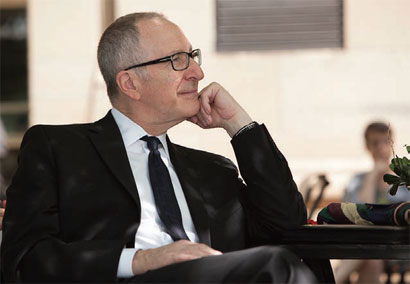Virtual learning communities, as Jim Roberts ’71 noted in the July/August 2013 issue, are as old as the “University” of Bologna, which in the eleventh century had no physical facilities, and as modern as the massive open online courses (MOOCs) that Cornell and many other universities are developing to share knowledge with students around the world.
Distance education, enabled by technology, can be offered entirely online or through a hybrid model that includes short but intense periods of learning on a college campus. Some courses carry college credit, while others lead to a professional certificate or other credential. Some are for personal or professional enrichment, without documentation of any kind other than a record of participation.
Cornell has been both a leader and a follower in the rapidly changing universe of technology-enabled education. It has been a leader through eCornell, which since 2000 has provided online certificate programs to more than 70,000 students in more than 200 countries around the world, in partnership with several of our colleges and schools. Last year, the Faculty Senate approved the use of eCornell to produce for-credit courses—potentially expanding the reach of our online programs.
The School of Continuing Education and Summer Sessions has offered distance learning courses since 1998—when lectures for a course in public relations and advertising were transferred to VHS cassettes and sent to those enrolled. Acting Dean Charles Jermy Jr., GR ’70–74, notes that because of the relatively asynchronous nature of the instruction, participants can accept jobs and internships while they are taking an online course, and the professor can be conducting research at a distant location while teaching.

The Cornell–Queen’s Executive MBA program in the Johnson School and a distance-learning master’s degree in systems engineering in the College of Engineering are both designed for professionals who do not want to interrupt their careers while pursuing an advanced degree. Johnson uses technology to deliver the MBA program to small groups of students in twenty-seven cities in North and South America, interspersed with periods of on-campus work. The systems engineering master’s includes two week-long, one-credit courses on campus, project work supervised by faculty, and online courses.
The Division of Nutritional Sciences offers free online education to nutrition and health professionals worldwide via the Cornell NutritionWorks website (www.nutritionworks.cornell.edu). The offerings include a twelve-unit training course developed in collaboration with UNICEF. To date, more than 5,700 professionals from 158 countries have registered for the course, and 34 percent have received certificates of completion.
Despite these activities, which are very much a part of the fabric of Cornell, until recently we have been followers in the larger movement toward MOOCs. Cornell faculty, however, have been accelerating our entry into this growing and increasingly visible sphere of teaching. Now that we have joined edX, a nonprofit consortium that provides a platform for MOOCs, distinguished faculty will develop not-for-credit CornellX MOOCs on American Capitalism; Relativity and Astrophysics; Networks, Crowds, and Markets; and Wiretaps to Big Data: Privacy and Surveillance in the Age of Complete Interconnection.
What can we predict from all this interest and activity? First, Cornell will not offer bachelor’s degrees online, at least for the foreseeable future. We believe that the invaluable experience of living and learning in a diverse academic community during the undergraduate years cannot be replicated online. What we will do is use technology—and what we learn from our online programs—to enhance on-campus education and broaden our understanding of how students actually learn.
At the professional master’s level, I see great potential for increasing the number of programs we can offer online and the number of students we educate online. These programs can reach eager learners who want to pursue advanced degrees without interrupting their careers and can provide significant revenue to the University. For example, a new ILR school master’s degree in human resources that will combine online and on-campus education has been approved by the Board of Trustees and Faculty Senate and is awaiting approval at the state level. In addition, as funding permits, I see great potential to build on programs like NutritionWorks to share knowledge with those who can benefit, including learners in the developing world.
An ad hoc faculty committee is guiding the expansion of our online educational offerings and other possible applications of technology-enabled learning to ensure that we derive maximum benefits from our efforts. I welcome your thoughts on distance learning and online offerings that would be of interest to you.


